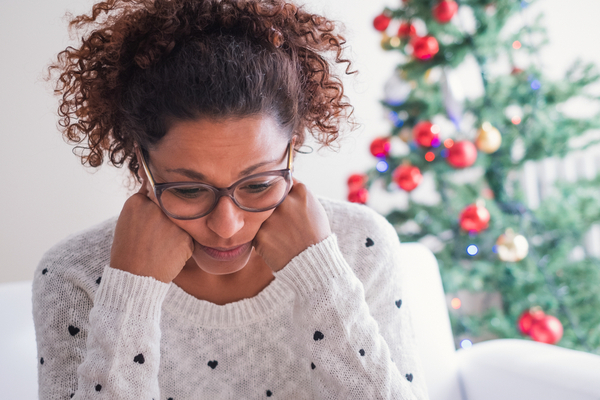While many people look forward to the holiday months, the “most wonderful time of the year” does not come without its fair share of stressful situations. From family to finances, this season can trigger anxiousness for some people, and exacerbate existing mental health issues. And with the ongoing pandemic, there is no doubt that the holidays will look different as more people choose to socially isolate, or only celebrate festivities with people in their household.
“Holidays are usually a hard time for some people, and part of that is the expectations and advertisement of these idyllic happy families. [This year] you have a higher amount of anxiety, depression, trauma, and substance use that’s happening even before the holidays begin,” says Ken Duckworth, chief medical officer at NAMI. In fact, a recent study conducted by researchers from the Boston University School of Public Health revealed that the percentage of adults in the United States experiencing depression symptoms has increased nearly threefold since the beginning of the pandemic. Further, alarming new research has suggested that 1 in 5 people infected with COVID-19 is likely to receive a mental health diagnosis within three months of contracting the virus.
As Debra Kissen, CEO for Light on Anxiety and member of the Anxiety and Depression Association of America, explained, the stressors that usually affect a person’s mental health, such as traveling, may not be as applicable during the 2020 holiday season — which can come as a relief. However, this also means that new stressors may pose risks to one’s well-being. Duckworth said that people tend to become more anxious with unknowns, because that’s the “body’s response to uncertainty.”
Notably, a main concern experts share is that more people will be socially distancing or quarantining during this typically celebratory season, contributing to greater feelings of isolation. “A new group of people will be experiencing loneliness this year, and that really is the number one thing that I think that leads to depression, anxiety and other mental health problems around the holidays,” said Paul Gionfriddo, the president and CEO of Mental Health America. “On top of that, grieving is becoming a more common thing as we lose more people to COVID-19. Financial worries are more present than they’ve been for the better part of a decade with more people unemployed and underemployed.”
Experts agree that fostering resilience is key to coping with the holiday season surprises this year. “I think of resilience as coping strategies and strengths that you already have to overcome adversity. The ability to withstand stress is a kind of resilience,” Duckworth said. “You may experience more anxiety, more isolation, more sadness. Those things are true, but what can you do to work against them?”
Of course, resilience looks different for every individual. However, Gionfriddo suggested that it’s invaluable to cultivate feelings of social connectedness — whether through joining online support groups, attending virtual gatherings, or even finding ways to be in nature. Furthermore, for people already living with a diagnosed mental illness such as bipolar disorder, understanding your holiday-related triggers, keeping to a routine, using your helpful coping skills, and relying on your support system can get you through the winter festivities. “Empower yourself to make your own decisions about what will give you happiness right now, so long as it’s not putting anybody else’s health at risk,” Gionfriddo said.
That said, experts say it’s important to be aware that general mental health concerns can become clinically significant. When “severe distress begins to impair functioning” and symptoms become more “frequent than fleeting,” proactively seeking out the support of a mental health professional is a good idea. Taking an online screening, or calling a help line could also help you in determining what kind of support you need.
There’s no mincing words: Navigating the 2020 holiday season isn’t going to be easy for everyone. Though the holidays will look different from years past, creating new traditions and staying socially connected with others can have a positive impact on your well-being. Being aware of your mental health needs can help make this year feel a little less daunting, and may even allow you to find some joy and comfort during the holidays.
—
Photo Credit: tommaso79 / Shutterstock.com
